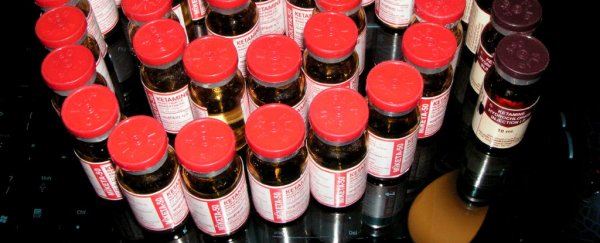Back in February, we reported how patients with severe depression have been reporting "unbelievable" relief from taking the psychedelic party drug, ketamine, with symptoms being treated within hours, and doctors reporting response rates of 75 percent.
It seemed too good to be true, but for patients who were unsatisfied with traditional anti-depressants taking weeks to show any effect - if they had any effect at all - the unconventional treatment has changed everything, and in recent years, research institutions across the US have been increasingly opting to treat their patients with ketamine.
While reports from patients and doctors have been incredibly positive, controversy surrounds the treatment, because the scientific evidence itself has been based on small, short-term studies. But a new study brings researchers closer to understanding the phenomenon, with researchers in the US reporting that a breakdown product of ketamine, not ketamine itself, could be what's imparting such fast-acting anti-depressant effects.
To catch you up on what's going on here, one of the worst things about living with severe depression is the fact that traditional anti-depressant drugs - known as selective serotonin reuptake inhibitors (SSRIs) - can be slow to work at best, or entirely ineffective, depending on the individual.
Not only do they take three to eight weeks to show any effects - which is extremely dangerous for people at risk of harming themselves - but once you make it through those months of waiting, there's no guarantee they'll actually work for you.
Ketamine, on the other hand, has been shown to be effective within just 2 hours, and while its effects are temporary and are not considered a cure, it's offered incredible relief for those who don't respond at all to SSRIs.
"It's not subtle. It's really obvious if it's going to be effective," Enrique Abreu, a Portland-based doctor who began treating depressed patients with ketamine in 2012, told The Washington Post earlier this year. "And the response rate is unbelievable. This drug is 75 percent effective, which means that three-quarters of my patients do well. Nothing in medicine has those kind of numbers."
But, as we reported earlier, scientists have been at a loss to explain ketamine's incredible effects - which appear to come without serious side effects or the risk of addiction.
Now a new study, published in Nature, brings us closer to an answer. Researchers in the US report that a breakdown product of ketamine - not the drug itself - appears to be responsible for the anti-depressant effects seen in a mouse study.
The discovery "could be a major turning point", one of the team, neuroscientist Roberto Malinow from the University of California, San Diego, told Laura Sanders at Science News. "I'm sure that drug companies will look at this very closely."
As Sanders explains, once ketamine is administered, the body breaks it down into a number of related molecules. One of these breakdown molecules, a chemical called (2R,6R)-hydroxynorketamine, appears to be behind the benefits, Malinow and his team report.
"On its own, a single dose of (2R,6R)-HNK reduced signs of depression in mice, restoring their drive to search for a hidden platform in water, to try to escape a shock and to choose sweet water over plain," says Sanders. "A type of ketamine that couldn't be broken down easily into HNKs didn't ease signs of depression in mice."
While we have to keep in mind that this is just one study, and the effects have been seen in mice, not humans, the possibility that ketamine's anti-depressant effects lie with a breakdown product rather than the drug itself is a really exciting prospect.
On its own, the drug has its benefits, but some patients report feeling uncomfortable with the whole 'it gets you high' thing - the feelings of dissociation and sensory distortion that make it such a popular party drug aren't exactly for everyone, so if scientists can isolate (2R,6R)-HNK and turn that into an anti-depressant drug, it could be huge.
"It's actually pretty amazing how high a dose we went up to and didn't see any ill effects," lead researcher and University of Maryland neuroscientist, Todd Gould, told Science News.
Gould and his team are now preparing a clinical trial so they can test the effects of (2R,6R)-HNK on humans, and figure out exactly how it alters the chemistry in the brain of people with depression.
Even if the breakdown product itself doesn't live up to its potential as a 'miracle treatment' for depression, understanding how it works could give researchers a new avenue of investigation in a field that so desperately needs better solutions for its patients.
"The whole field has become interested in ketamine," Gould told Heidi Ledford from Nature. "It does something different in patients than any other drug we have available."
